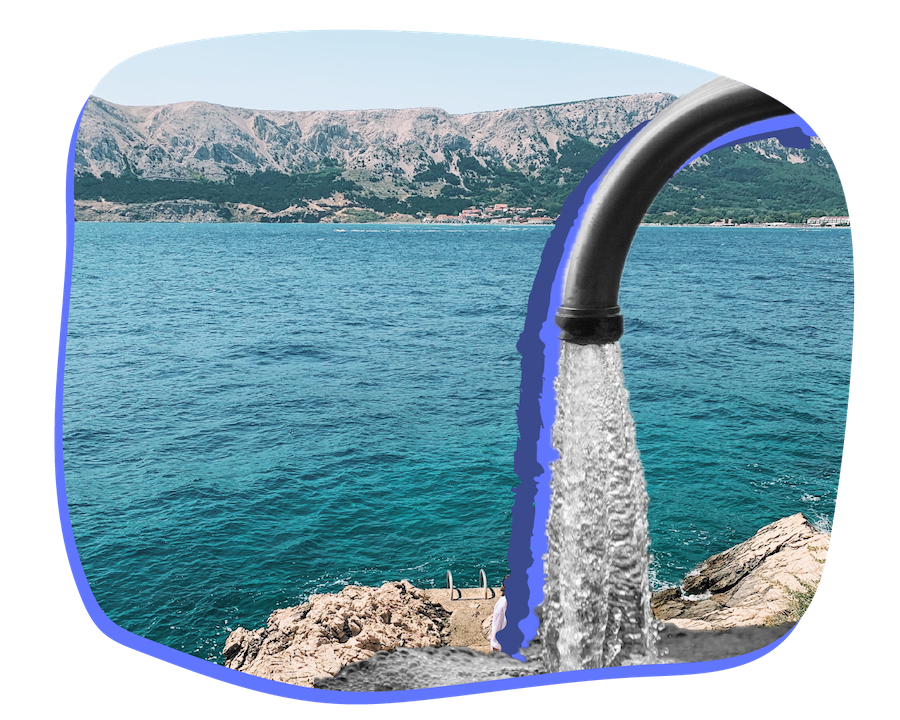Will we run out of water?
We need to talk about eco-anxiety
Author: Raquel Frescia
Editor: Sophie Palmer, Tanya Singh
My Story
My name is Raquel Frescia, age 22. Six years ago, at the age of sixteen, I moved from the bitter Peruvian summer into the unbearable winter of Stockholm. Whilst I was startled by the low temperatures, I was even more astounded by the blasé attitude towards water consumption. There, lengthy showers weren't uncommon. Meanwhile, these were essentially unheard of in Peru: a vague hope that only the most affluent could attain. Unlike in Sweden, water in Peru can be pricey and, in many parts of the country, non-available.
I grew up in Ica, a city located along the desert coast of southern Peru. Ica is the "Land of the Sun" because its climate feels like a northern summer year-round. This makes Ica an important agricultural region, growing and exporting cotton, grapes, asparagus, avocado, mango, and olives – crops that rely on millions of cubic metres of water each year. And although we only count on 1 inch of rainfall a year, we can supply a significant part of the region by drawing from an aquifer approximately 75 km long fed by glacial meltwater. Unfortunately, mainly due to agro-exportation, the regional usage has exceeded the water inflow into the aquifer for decades, and the aquifer is slowly emptying. This is why, in 2010, a state of emergency was declared.
A Commiditable Resource
This extraction began on a small scale in the 1930s but was banned in the 1970s to preserve the aquifer’s water levels. However, drilling was reintroduced at unparallelled and unregulated levels in the 1990s to facilitate an export economy funded by private investment. Thus, privatising the land and water services as a means of economic development for our country, although at the expense of its citizens, directly impacting our access to drinking water.
As Beze Gray (featured in Episode Five, Season Two of the Force of Nature podcast) said, "The water systems don't belong to anyone. It's just water. [...] It just flows.”
Deforestation and the Hydrologic Cycle
The discrepancy between water supply and demand in Ica and other parts of the world is exacerbated by climate change. This is because climate change influences critical factors like the hydrologic cycle variability, water quality, water availability, water allocation, and water demand.For example, rising temperatures increase evaporation and precipitation, leading to a higher frequency of droughts and floods and dramatic snowfall and snowmelt changes. Rising temperatures also affect water quality, for example, by eutrophication. Furthermore, climate change also increases the demand for farm irrigation, garden sprinklers, and even swimming pools.
However, addressing water scarcity requires a multidisciplinary approach. Therefore, investment in infrastructure in the water sector and socio-economic and socio-political intervention without compromising ecosystem functioning are also of high importance.
Water Scarcity: A Global Concern
Severe water scarcity is a crisis that half of the world’s population —about 4 billion people— face for at least one month of the year. Worldwide, more countries than you could imagine have significant populations whose only water source is highly contaminated. Take Sudan, for example, where over 14 million people find themselves in this position daily.
"Water doesn't respect boundaries; it flows across boundaries."
Caroline Hickman, E5, S2, Force of Nature podcast
Disputes between regions over the rights to access water resources have arisen persistently throughout history, dating back nearly six thousand years. Water conflicts occur for several reasons, including territorial disputes, a fight for resources, and strategic advantage. However, these conflicts arise primarily over freshwater out of a need for potable water, irrigation and energy generation.
For example, the Nile's water has affected the politics of Eastern and the Horn of Africa for decades. The dispute between Egypt and Ethiopia over the $4.5 billion Grand Ethiopian Renaissance Dam has become a national preoccupation in both countries, stoking patriotism, deep-seated fears and even murmurs of war. Countries including Uganda, Sudan, Ethiopia and Kenya have complained about Egyptian domination of its water resources.
Several attempts have been made to establish agreements between the countries sharing the Nile waters. However, without a better understanding of the availability of the future water resources of the Nile, it is possible that conflicts could arise between these countries relying on the Nile for their water supply, economic and social developments.
As with the climate crisis, not every country will be affected by water variability in the same way or to the same degree. Scientists estimate that, at the current consumption rate, in 2025, two-thirds of the world's population will face water shortages. These water shortages would be more prevalent among countries with limited resources and rapid population growth, such as Mexico, South America, Northern and Southern Africa, and Asia.
Access to Clean Water: A Fundamental Human Right
On average, the human body can function no longer than three days without water. Thus, people living in water scarcity must travel miles by foot to collect water, taking up valuable time that could be used working, studying, or spending time with loved ones. Health is also of primary concern: such long walks imply a higher need for macro and micronutrients and water and significantly impact mental health.
More often than not, the water accessed by these populations is inadequate for human consumption or sanitation. Illnesses caused by these unsanitary water sources affect these communities' quality of life more than it would affect ours. They typically do not have access to health care, and, as a result, they often become too ill to develop, study, work, or care for their families, leading to further illness and poverty.
Furthermore, water scarcity does affect not only humans but also entire ecosystems. For example, about half of the world's wetlands have been destroyed in the past 30 years. Wetlands serve as nurseries for many mammals, birds, fish and invertebrates. Wetlands also support rice cultivation, a staple in the diet of half the world's population. And they provide a range of ecosystem services that benefit humanity, including water filtration, storm protection, flood control and recreation.
When water becomes scarce, natural landscapes often lose out. For example, the Aral Sea in central Asia was once the world's fourth-largest freshwater lake. But in only three decades, the sea has lost an area the size of Lake Michigan. It is now as salty as an ocean due to the excessive pollution and water diversion for irrigation and power generation. As the sea has retracted, it has left polluted land. This ecological catastrophe has created food shortages and resulted in a rise in infant mortality and a decrease in life expectancy for the nearby population.
But there is hope. Countless organisations and individuals are fighting against such grim predictions. In 2015, the United Nations General Assembly (UNGA) established "Ensure availability and sustainable management of water and sanitation for all" as one of their 17 Sustainable Development Goals. In 2010, UNGA recognised "water and sanitation" as a human right. Being protected by local and international law has resulted in the improvement of water management around the world.
Eco-Anxiety: A Good Omen
I know - thinking about water scarcity is overwhelming. As I write, I'm experiencing extreme worry, distress, and fear. My heart rate is accelerating; my chest hurts; my mouth is dry. I'm sweating; I'm cold; I'm nauseous. Of course, we all experience anxiety in different ways and to different degrees. But be sure to remind yourself that eco-anxiety is a reflection of how desperately we want to see change.
That's the first step - educating yourself on the injustices of the world. The second step is to dream of a future where everyone prospers. The chair you rest on, the bus that drives you to school, the glass from which you sip —everything around you exists because someone imagined that life could be easier to navigate and acted on it.
Then, finally, realise the power you hold. Remember, a person, like you and I, invented something as simple as the roof and as complex as the internet. But, of course, they didn't do it alone, and we don't have to either.You'd be surprised by how many people are eager to make a change. I hadn't realised this before I joined the community of Force of Nature.
At Force of Nature, I've also realised that anxiety is a sensible response. Still, it can be a limiting agent in change-making. So allow yourself to feel empathy and despair, but do not let it govern your days. Instead, seek help from people you trust —family, friends, teachers, professionals. Or drop me an email: we can chat about books, coffee, and the world.
And do not forget to educate yourself —how could we act on an issue we don't fully understand? Research causes and impacts; conceptualise solutions. Many of your plans will be out of your grasp, countless others will be foolish, and several of the ones you try out will fail. Make errors, learn from them, keep striving. Examine what others are doing and do it better. Ask questions and offer guidance to others taking action too.
Remember that slight changes can have enormous consequences. For example, as a keen gardener, you could water your plants with greywater or collected rainwater. As a keen cook, you could steam some foods instead of boiling them. Find solutions that accommodate your lifestyle.
As spoken by Caroline Hickman on the podcast, “the symbolism of water is really the way to understand it. Water does not respect us, we need to respect water.” The ebb and flow of water is a lesson to us all; and one that should never be taken for granted.
You can listen to Episode 5, Season Two of the Force of Nature podcast here.

